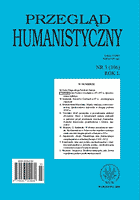STOSUNKI POLSKO-BELGIJSKIE W LATACH 1830–1863
POLISH-BELGIAN RELATIONSHIPS IN THE YEARS 1830–1863
Author(s): Marta KozłowskaSubject(s): Cultural Essay, Political Essay, Societal Essay
Published by: Wydawnictwa Uniwersytetu Warszawskiego
Keywords: relationship; polish; Belgian; stosunki; polsko-belgijskie; lebeau
Summary/Abstract: In 1815, based on the Vienna Congress, the Kingdom of the Netherlands was created – an artificial form binding two different nations: the Belgians and the Dutch. The growing conflict between the two finally burst out in 1830. As a result the National Congress was summoned and on 18th October an independent Belgian state was created. When the Russian decided to make an intervention sending Polish soldiers, the Polish made an uprising. Keeping Russia busy with it made it impossible for Russia to participate in the London conference, where European powers dealt with the Belgian-Dutch conflict. Joseph Lebeau, a new minister of foreign affairs of Belgium, cooperating with England, referred to the Polish events in order to push the issue forward. At that time Polish diplomats tried to draw the public attention to the Polish events. After the decline of the November Uprising, some of its participants (Lelewel, Heltman, Worcell) found shelter in Belgium, creating the Polish emigration circle. Polish officers (Skrzynecki, Kruszewski) were to play a major role in the army there, but the need to make positive bonds with Russia damned it. The Polish left the Belgian army in 1853. Belgian politicians lost interest the January Uprising. However, many Polish refugees found shelter there (Jeż, Merzbach, Wolski, Wieniawski brothers), staying on the exile for ever.
Journal: Przegląd Humanistyczny
- Issue Year: 415/2007
- Issue No: 06
- Page Range: 83-101
- Page Count: 20
- Language: Polish
- Content File-PDF

